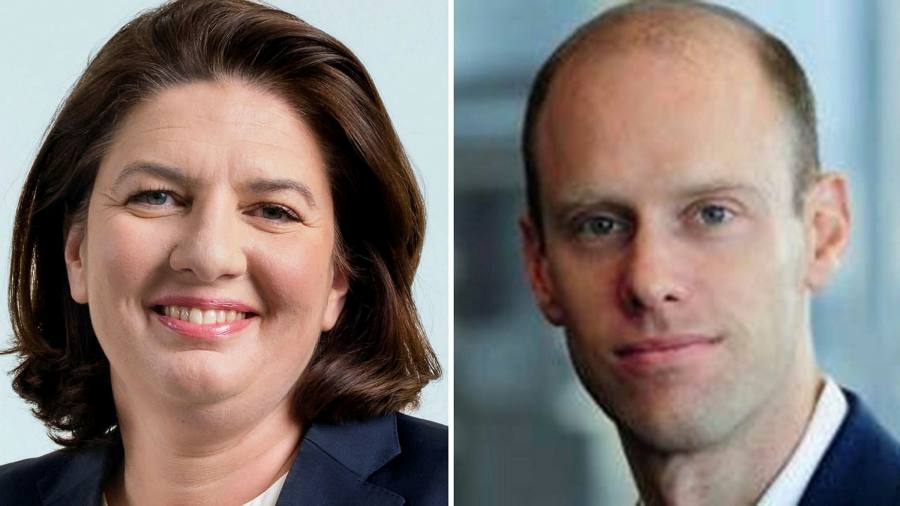[ad_1]
The simultaneous arrival of two new chiefs at Amundi and BlackRock in Europe promises more fireworks in the fierce battle already under way between the region’s two largest asset managers.
Valérie Baudson taking the helm from Yves Perrier as CEO at Amundi also opens a new chapter in the rivalry between the €1.7tn French asset manager and New York-based BlackRock. News of her promotion came just after BlackRock said that Stephen Cohen, head of the iShares ETF and index investing business in Europe, Middle East and Africa, would become European chief, replacing Rachel Lord who is being redeployed to Asia.
“The rise of these two executives is a clear illustration of the strategic importance of ETFs as drivers of growth for both businesses,†said Deborah Fuhr, founder of ETFGI, a consultancy.
Successful acquisitions have helped nearly double Amundi’s assets under management in the last five years, creating Europe’s regional champion with the heft to compete with US rivals fast expanding on its doorstep. Amundi’s biggest challenge is to grow its passive investing business more rapidly at a time when BlackRock is surging ahead.
BlackRock’s assets in the Emea region have grown by 30 per cent to $2.43tn under Lord’s leadership since September 2017.
Chief executive Larry Fink’s memo to BlackRock staff announcing the changes highlighted a near doubling of iShares ETF assets over the same period under Cohen.
“Stephen will advance the strategy he helped to build under Rachel’s leadership, growing iShares, private markets, Aladdin, cash and active strategies,†Fink wrote in a clear pointer to his priorities.
Baudson, who built Amundi’s ETF unit from scratch, needs to make a fast start on regaining ground lost to the BlackRock juggernaut.
Haley Tam, an analyst at Credit Suisse in London, said the new chief’s early moves will be watched closely. “Baudson has a lot of choices to consider given her previous roles in running active strategies, thematics, wealth and distribution as well as ETFs,†she said.
The biggest battle ahead lies in the relentless shift into passive strategies, including mutual fund trackers that follow an index, which has accelerated markedly in Europe in recent years, mimicking a trend first established in the US.
Close to 60 per cent of the net inflows into long-term funds sold in Europe last year went into ETFs and passively managed mutual funds, according to Refinitiv Lipper, the data provider.
The clearest winner of this shift is BlackRock which has built a dominant position in Europe.
BlackRock’s European-listed ETFs registered net investor inflows of $58.2bn last year, lifting assets managed by its iShares unit in Europe to $570bn in December. This represents a 44 per cent market share of European ETF assets, according to ETFGI.
Challenging that lead is a massive headache for all of its competitors.
Amundi’s ETF business ranks as the fifth largest in Europe with a market share of 6.1 per cent. Amundi’s European-listed ETFs attracted net investor inflows of $8bn last year, boosting assets to $78.5bn in December.
“Finding a way of closing the gap with iShares will be a priority for Amundi under Valérie Baudson,†said Fuhr.
Amundi has a history of buying investment businesses and the acquisition of an additional ETF manager would accelerate growth.
Lyxor, the €159bn French asset manager, which is ranked as the third largest ETF provider in Europe, is an attractive target for a group wishing to build scale.
Buying Lyxor would help Amundi leapfrog Germany’s DWS to number two in the ranking of European ETF providers and create a more powerful competitor to BlackRock.
However, growth at Lyxor’s ETF business has stalled badly over the past two years. It chalked up net inflows of just $548m after a disappointing 2019 when it saw outflows of $5.4bn.
Talk that Lyxor’s owner Société Générale wants to sell has been circulating for more than a year. Reuters reported in September that SocGen was expected to start a sale process before the end of December and anticipated achieving a $1bn price. DWS, BNP Paribas, JPMorgan and State Street Global Advisors have been mooted by analysts as potential buyers.
Michael Werner, an analyst at UBS in London, said Amundi buying Lyxor would make sense.
“Amundi is an M&A success story. The new CEO ran the ETF and indexing business, Amundi will have €1.2bn excess capital even after paying the 2020 dividend and it would benefit by building more scale in ETFs,†said Werner.
City analysts tried to press Amundi’s management about M&A options after the company announced full-year results last week. But no new information was provided.
“Amundi looks to be in a strong capital position to support any new M&A ambitions,†said Tam at Credit Suisse.
Another analyst, who declined to be named, said: “A deal with Lyxor matters more for Amundi than other possible bidders. Amundi’s ETF business looks significantly challenged if it doesn’t acquire Lyxor.â€
Perrier, who moves to Amundi chairman in May, told the FT last week that banks and insurers owned “many†asset management businesses that were subscale and inefficient.
“We have demonstrated that we can execute deals, integrate businesses successfully and deliver more synergies than expected. Amundi is the natural consolidator,†he said.
[ad_2]
Source link





